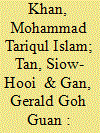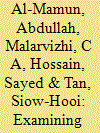| Srl | Item |
| 1 |
ID:
163303


|
|
|
|
|
| Summary/Abstract |
This article presents the advanced financial literacy of Malaysian Gen Y investors and investigates whether literacy varies across demographics and ethnicity, and how financial literacy is related to investing decisions. In a survey-based study (N = 231) with the estimation of crosstab, ordered logistic regression and binary logistic regression, the results suggest that Gen Y investors display a medium level of financial literacy and that investors with certain demographic characteristics and ethnicity display a relatively higher level of financial literacy. Literacy items such as knowledge of stocks and bonds, functioning of the stock market, working of long-term bonds and mutual funds, and riskiness of bonds versus stocks are more closely related to investors’ trading, risky share investment, willingness of risk-taking, stock market participation and perceived portfolio returns. The results imply a clear scope to improve Gen Y investors’ financial literacy by concentrating on a certain socio-demographic groups and specific financial literacy items.
|
|
|
|
|
|
|
|
|
|
|
|
|
|
|
|
| 2 |
ID:
111869


|
|
|
|
|
| Publication |
2012.
|
| Summary/Abstract |
This study employs a cross-sectional design with stratified random sampling method to examine if the microcredit programme of the Amanah Ikhtiar Malaysia (AIM) improves the income of hardcore poor households. This study uses a quasi-experimental approach and selected control and treatment group members from AIM's client's base - new and old clients respectively. It is evident that the AIM's microcredit programme increased the household's income and reduced the poverty rate among their hardcore poor clients in Peninsular Malaysia. Findings of the study indicate the effectiveness of microcredit in eradicating poverty. This programme should, therefore, focus on diversifying their products and services in order to increase outreach and decrease inactive borrowers and dropouts.
|
|
|
|
|
|
|
|
|
|
|
|
|
|
|
|